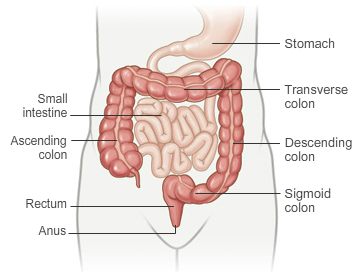
Irritable bowel syndrome (IBS) is a common condition of the digestive system. It can cause bouts of stomach cramps, bloating, diarrhoea and constipation.
The symptoms of IBS usually appear for the first time when a person is between 20 and 30 years of age. They tend to come and go in bouts, often during times of stress or after eating certain foods.
Sufferers may find the painful stomach cramps of IBS ease after going to the toilet and opening their bowels.
Most people have a flare-up of symptoms that lasts two to four days. After this time, the symptoms usually improve but do not disappear completely.
The most common symptoms of IBS are:
- abdominal pain and cramping – often relieved by emptying of the bowel.
- a change in bowel habits – such as diarrhoea, constipation, or sometimes both
- bloating and swelling of the abdomen
- excessive wind (flatulence)
- an urgent need to go to the toilet
- the patient feels that they need to open their bowels even if they have just been to the toilet
- a feeling they have not fully emptied their bowels
- passing mucus from the anus
Due to the embarrassment, pain and discomfort of IBS, many people with the condition also have feelings of depression and anxiety.
What causes IBS?
The exact cause of IBS is unknown, but most experts agree it’s related to an increased sensitivity of the entire gut, which can occasionally be linked to a prior food-related illness.
This may be caused by a change in the body’s ability to move food through the digestive system, or may be due to the patient becoming more sensitive to pain from their gut.
Psychological factors such as stress may also play a part in IBS.
Treating IBS
There is no known cure for IBS, but the symptoms can be managed by making changes to diet and lifestyle.
Medication is sometimes prescribed for IBS. Although the symptoms of IBS can be troublesome, the condition does not pose a serious threat to a patient’s health. For example, it will not increase the chances of developing cancer or other bowel-related conditions.
IBS is unpredictable. A patient may go for many months without any symptoms and then have a sudden flare-up. It can also take many months for symptoms to settle down.
IBS can be painful and debilitating, and can have a negative impact on a patient’s quality of life.
